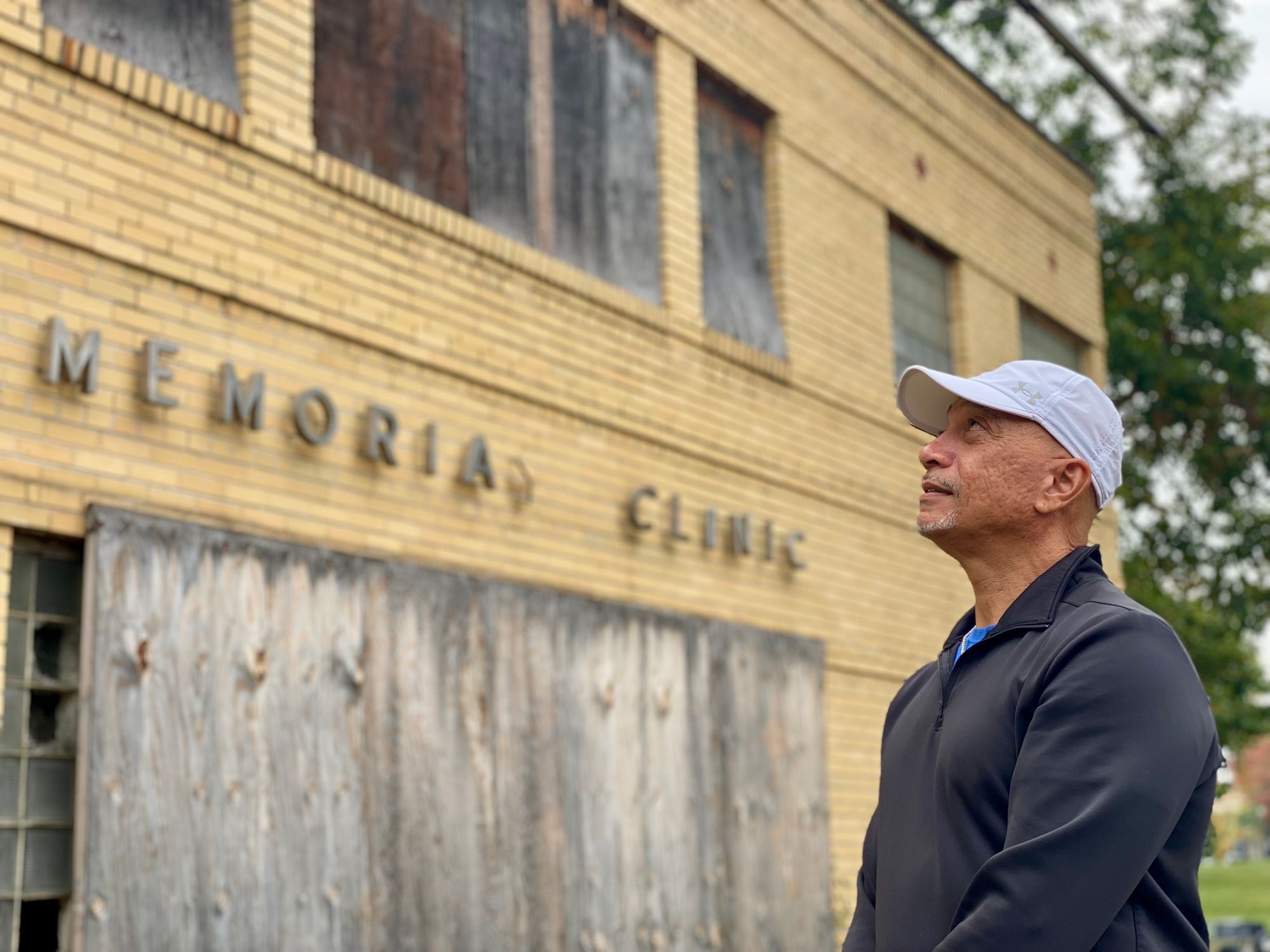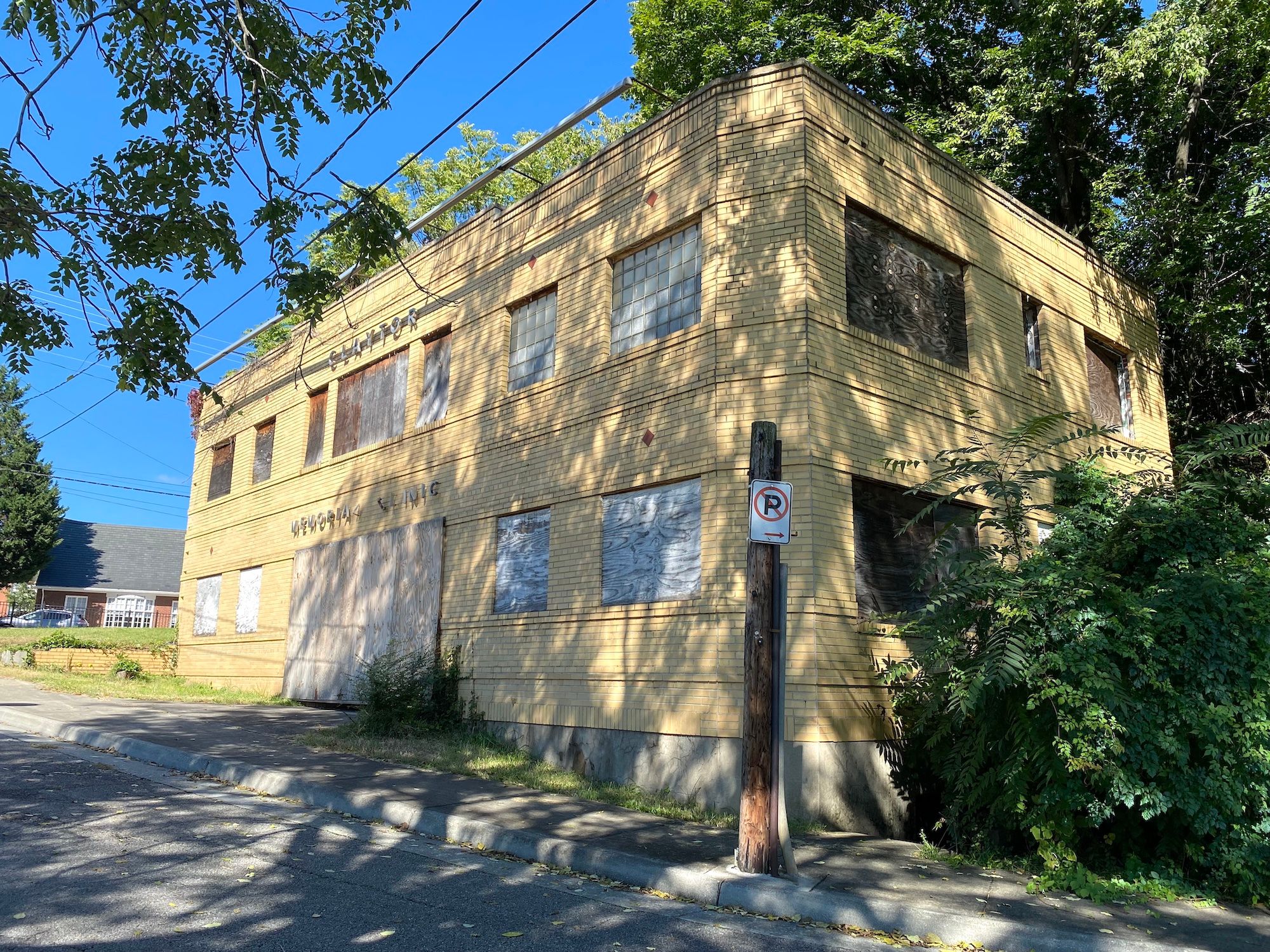Claytor Family Makes New Bid For City To Buy Gainsboro Clinic Property, Which Council Rejects
The rejection marks an about-face by Roanoke city officials, who in 2021 began negotiating with Claytor family about buying the property.

After Roanoke City’s attempt to buy Gainsboro’s historic Claytor Memorial Clinic property fell apart last year, Claytor family members regrouped.
This month, the Claytors pitched city officials on a new plan, agreeing to sell the one-acre property at Jefferson Street and Patton Avenue as part of the city’s efforts to revitalize the once-vibrant Black neighborhood.
The city has earmarked $5 million in federal pandemic relief funds for Gainsboro. But an initial plan to establish a hub focused on business development and healthcare has since fizzled.
Last week, City Council rejected the Claytor family’s proposal for the city to purchase the land, according to an email that City Manager Bob Cowell sent to Dr. Conrad Claytor, who helped spearhead the new pitch and shared a copy with The Rambler.
“As has been the case for the past 2+ years, the Council remains interested in seeing something productive occur on the property and remains committed to the stabilization of the Gainsboro area, predominantly through the successful implementation of the recently approved Gainsboro Community Hub Plan,” Cowell wrote Claytor. “At this point, however, the Council is not interested in acquiring the property but rather remains interested in supporting a private-led redevelopment effort.”
Two Council members declined to comment, with one noting that the discussion occurred in a closed session, for which state law allows when a city explores acquiring property.
The rejection marks an about-face by city officials, who in 2021 began negotiating with Claytor family members who have a stake in the property. The initial idea, Cowell said last year after the deal fell apart, was that the city would acquire the property, get the building renovated and turn ownership back to the community, such as through a local nonprofit.
Since Council adopted a community hub concept plan this summer, priorities have shifted. No longer does the city envision creating a center for healthcare and small businesses with the $5 million in pandemic relief funds.
Instead, the city is planning to spend $2.5 million on infrastructure and safety improvements along Gainsboro Road, $2 million on outdoor public gathering and recreation spaces, and $500,000 on owner-occupied housing repair grants in the neighborhood’s historic district, according to Wayne Leftwich, the city’s planning manager.
Leftwich said the city anticipates road upgrades — including a reduction from four to two traffic lanes and pedestrian signals at stoplights — to start next fall. The city is still investigating options for outdoor public spaces. Leftwich said the investment is aligned with the community hub concept plan and feedback from residents.
Conrad Claytor, a retired podiatrist who lives in Salem, said he renewed talks with family members about the clinic property after the city unveiled a draft of the hub plan this spring.
That 60-page plan from a Richmond-based consultant included ideas for retail on Henry Street; a healthcare center and a grocery store on the Claytor Clinic property; and a community center and housing along Jefferson Street.
“It still listed the Claytor property,” Claytor said. “So I guess our assumption was that, well, this was still an important part of their plan because it was still in their hub plan.”
Disagreements about who could dispose of the property — owned by the defunct Claytor Inc. — contributed to the first breakdown in negotiations between the family and city.
The Claytors’ proposal lists 23 family members, who Conrad Claytor said have approved of a sale for $515,000, which is based on an appraisal the family commissioned in August from Vail Appraisal. In October 2021, the city offered to buy the property for $420,000, based on a recent assessment, according to a purchase agreement.
“It was a unanimous vote yes for them to move forward with that,” Faye Claytor-Wood, who grew up in the Claytor homestead that once stood on the site, said of the property's 23 heirs.

In 1948, Dr. John B. Claytor Sr. — Claytor and Claytor-Woods’s grandfather — opened the health clinic, one of the first Black-owned clinics in Southwest Virginia. Urban renewal beginning in the 1950s destroyed Black homes, businesses and churches in Northeast Roanoke and Gainsboro, leaving the neighborhood unmoored. The clinic closed in the 1990s.
The proposal also includes a conceptual sketch from Barnes Design Group, a Virginia Beach architecture firm. Designs show a renovated Claytor Clinic, a three-story condominium, a corner cafe and space for retail shops, as well as parking for electric vehicles on Jefferson Street.
Conrad Claytor said those recommendations were based on the hub plan and conversations with residents, noting the desire for more owner-occupied housing. He estimated that between legal fees during the first negotiations and the architectural and appraisal work, the family has spent about $10,000.
The proposal focuses on the historical nature of the area. The document suggests establishing a park named after Francis Woodfin, a craftsman who constructed the Claytor family home, and “Kitty’s Kafé,” after Catherine “Kitty” Taylor, a cook, pharmacy worker and civic leader.
In his email to Conrad Claytor, Cowell said the city is amenable to working with the family to bring new life to the property.
“Council instructed staff to support you in any efforts you may undertake to secure private parties in redevelopment of the property – this may include introduction to prospective developers, participating in meetings with prospective developers, etc.,” Cowell wrote.
Claytor said Friday that he needs to consult with other family members about next steps.
“I was disappointed,” Claytor-Wood, who lives in Roanoke, said of the city’s response. “It has the smell of urban renewal updated.”
Nelson Harris, a former mayor, attended a meeting a couple weeks ago with Claytor family members, advocates and city officials including Cowell and Leftwich about the latest pitch.
Harris also described Council’s response to the proposal as “disappointing.”
Earlier this month, the Virginia Department of Historic Resources approved a marker for the Claytor clinic that Harris had pushed for. The department noted, “In the 1970s the city planned to acquire the clinic and other Claytor-owned buildings using eminent domain but then never actually did so, leaving the properties in limbo for years. In 2001 the Claytors initiated legal action that helped inspire limitations on redevelopment authorities and eminent domain.”
“My feeling personally is that the city ought to seek to remedy what I think had been a very complicated past with that property,” Harris said. “My hope would have been, and my hope still is, that the city would seek to be an active partner in the development of the property.”
The proposal contains several endorsements from community leaders, including from a Gainsboro neighborhood association and the Roanoke branch of the NAACP.
In a letter, Brenda Hale, the NAACP branch president, described the Claytors’ proposal as a chance to heal wounds from urban renewal, writing: “The Gainsboro Community has been neglected far too long, this opportunity would give the residents hope for a better future.”

